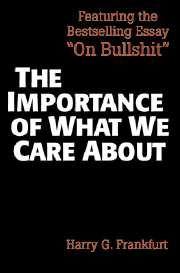Book contents
- Frontmatter
- Contents
- Preface
- Sources
- 1 Alternate possibilities and moral responsibility
- 2 Freedom of the will and the concept of a person
- 3 Coercion and moral responsibility
- 4 Three concepts of free action
- 5 Identification and externality
- 6 The problem of action
- 7 The importance of what we care about
- 8 What we are morally responsible for
- 9 Necessity and desire
- 10 On bullshit
- 11 Equality as a moral ideal
- 12 Identification and wholeheartedness
- 13 Rationality and the unthinkable
3 - Coercion and moral responsibility
Published online by Cambridge University Press: 05 June 2012
- Frontmatter
- Contents
- Preface
- Sources
- 1 Alternate possibilities and moral responsibility
- 2 Freedom of the will and the concept of a person
- 3 Coercion and moral responsibility
- 4 Three concepts of free action
- 5 Identification and externality
- 6 The problem of action
- 7 The importance of what we care about
- 8 What we are morally responsible for
- 9 Necessity and desire
- 10 On bullshit
- 11 Equality as a moral ideal
- 12 Identification and wholeheartedness
- 13 Rationality and the unthinkable
Summary
On some actions praise indeed is not bestowed, but pardon is, when one does what he ought not under pressure which overstrains human nature.
Aristotle, Nicomachean Ethics III, 1, 1110aThe courts may refuse to admit in evidence, on the grounds that it was coerced, a confession which the police have obtained from a prisoner by threatening to beat him. But the prisoner's accomplices, who are compromised by his confession, are less likely to agree that he was genuinely coerced into confessing. They may feel, perhaps justifiably, that he made a reprehensible choice and that he acted badly: he ought to have accepted the beating rather than to have betrayed them. Thus sometimes, though not always, the use of the term “coercion” conveys an exclusion of moral responsibility. A person who acts under coercion is for that reason regarded as not having acted freely, or of his own free will. It may be established that a person is not to be credited or blamed for what he has done, then, by showing that he was “coerced” into doing it.
A person is sometimes said to have been coerced even when he has performed no action at all. Suppose that one man applies intense pressure to another man's wrist, forcing him to drop the knife in his hand.
- Type
- Chapter
- Information
- The Importance of What We Care AboutPhilosophical Essays, pp. 26 - 46Publisher: Cambridge University PressPrint publication year: 1988
- 20
- Cited by

